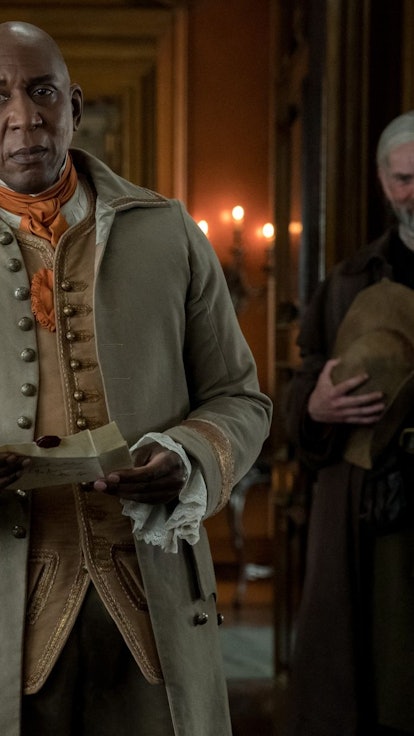His character Ulysses may be gone and headed to England in the TV show Outlander, but Colin McFarlane is still dishing out the Outlander news. In a virtual event for the genealogy site Findmypast, McFarlane revealed a new character in the ninth Outlander book, Go Tell the Bees That I Am Gone. The actor said he spoke to Outlander author Diana Gabaldon ahead of the July 29 event, who exclusively told him there will be a new character in Bees who shares a name with a notable Scottish freed slave.
The British actor was sharing the story of the freed Scottish slave Scipio Kennedy from the 18th century. McFarlane compared the real-life historical figure's life to his fictional Outlander character Ulysses, as they both were freed legally, but still bound to their previous owners. In preparation for the discussion, he spoke to Gabaldon and she gave him the green light to share some Bees-related news. At the 4:52 mark in the below video, McFarlane says, "She also has a new character, who is another freed slave and unbelievably is called — you guessed it — Scipio."
Gabaldon has featured many characters influenced by real-life historical figures, but McFarlane didn't reveal how much Scipio in Bees will be inspired by the real Kennedy when the book is released on Nov. 23. Kennedy's birth name was lost, but he was born in Guinea and captured and sold into slavery in 1700 when he was only 6 years old. He was forced to the West Indies before being bought by Captain Andrew Douglas and brought to Scotland in 1702. As McFarlane explains, Douglas most likely named the boy for the Roman general Scipio Africanus as there was "slave-naming tradition of the time using the names of powerful leaders to mock the slaves' powerlessness." Kennedy later served Douglas's daughter Jean and her husband John Kennedy and in 1725, he was given his freedom. But, as McFarlane noted, just because he had been manumitted from slavery didn't mean he lived life freely in the way 21st-century people may expect.
